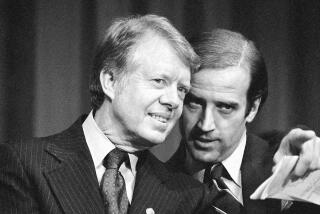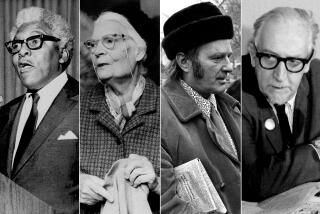Stephen G. Cary, 86; Quaker Humanitarian
- Share via
Stephen G. Cary, a leading Quaker who led public-service work camps for conscientious objectors during World War II, has died at the age of 86.
Cary died Tuesday of unstated causes at his summer home in Chatham, Mass., on Cape Cod.
A resident of Haverford, Pa., Cary worked most of his career for the American Friends Service Committee, the national Quaker humanitarian organization. He led the group, holding the position designated simply as clerk, from 1979 to 1991.
During the war, Cary led two government-approved work camps, in Elkton, Ore., and Big Flats, N.Y., for pacifists who performed national service rather than being drafted into the military.
A public television documentary on the subject, “The Good War and Those Who Refused to Fight It,” was shown this year. The program described the government’s provision for about 12,000 members of historically pacifist denominations--including the Religious Society of Friends, commonly called Quakers, and the Mennonites--to avoid military service by performing duties in civilian work camps.
Despite the conscientious objectors’ manual labor on behalf of the nation, they often experienced discrimination and taunts of being unpatriotic. Cary, in the documentary, said the men performed the labor without pay and without financial support for their families.
He also described their make-work tasks as meaningless, likening the assignments to “knitting all day and unraveling all night.”
Born to a Quaker family in Philadelphia in 1915, Stephen Grellet Cary had the pacifist tradition stamped on him at an early age when his father abruptly quit a good job because his company accepted a military contract. When Cary received his draft notice in 1942, he took conscientious objector status and spent the war in the civilian work camps.
Afterward, he headed the American Quaker relief operations in Europe for three years, overseeing work in 10 countries. The effort helped the service committee earn the Nobel Peace Prize in 1947, along with the Friends Service Council, its British counterpart.
Cary was also active in broader civil rights efforts. In 1968, he was jailed for 15 days for civil disobedience for participating in a Washington, D.C., demonstration organized by the Poor People’s Campaign.
In the conscientious objector documentary earlier this year, the humanitarian Cary noted: “Every great change in expanding the dimensions of human freedom has come from very small beginnings: Somebody said no.”
Cary, who held a bachelor’s degree from Haverford College and a master’s in international administration from Columbia University, was named a vice president at Haverford in 1969. He served as acting president in 1977-78, when the all-male college was preparing to become coeducational.
He is survived by his wife of 54 years, Elizabeth; three children; one sister; and seven grandchildren.
More to Read
Sign up for Essential California
The most important California stories and recommendations in your inbox every morning.
You may occasionally receive promotional content from the Los Angeles Times.








